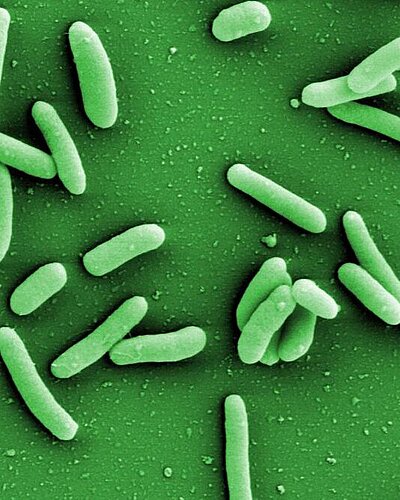Our Research Program
Together with 100 guest scientists from all over the world, our researchers collaborate in selected Research Foci to address urgent problems of high clinical relevance. With sophisticated laboratory techniques they observe pathogens and immune cells during the moment of infection. They analyse the molecular structure of the “weapons” that pathogens utilize to invade a host cell – and develop methods to defuse them. They seek for substances from nature or lab that neutralize pathogens, prevent infections or are even able to cure them. They use high tech analytical devices and study the processes of infections in cell culture, in mice, in complex computer simulations, in individuals, groups of patients and whole populations – for a healthier future.
The program "Infection Research"
The development of efficient strategies against infections requires a deep understanding of the complex interactions between pathogen and patient, with an eye towards possible treatment options.
The structure of the program Infection Research reflects this requirement. It aims to achieve detailed knowledge on the levels of host, pathogen and treatment or prevention. Consequently, the HZI Program Infection Research is organized in three integrated Topics, providing expertise on pathogens, immune system and anti-infective drugs, respectively.
Research Topics
The single research projects of the HZI are assigned to the three topics within the research programme:
- Bacterial and viral pathogens (Topic 1)
- Immune Response and Interventions (Topic 2)
- Novel Anti-infectives (Topic 3)
An intensive contact and exchange between the different topics, in particular in the context of defined Research Foci addressing specific problems of clinical relevance, secures the programme’s success.
The research topics are supported by state-of-the-art research facilities. These facilities provide both the scientists at HZI and the larger infection research community with access to cutting-edge technologies.
Bacterial and viral pathogens

The Topic "Bacterial and Viral Pathogens" focuses on the role of pathogenic bacteria and viruses in infectious disease processes. Scientists in this Topic study pathogens and their dynamic interplay with the host. They aim to understand the molecular bases of virulence, persistence and resistance, and to determine risk factors for the spread of diseases. They identify structures and mechanisms enabling pathogens to infect the host in order to identify promising targets for new therapies and new ways of diagnosis. To this end, they pursue a broad range of research approaches and use comprehensive profiling technologies as well as data analysis techniques to dissect pathogen features relevant for virulence and resistance. Furthermore, Topic 1 implements novel mobile health surveillance systems for rapid outbreak response and takes advantage of the German National Cohort (GNC) to investigate associations between infections and non-communicable diseases.
Topic Speaker: Prof Chase Beisel
Deputy Speaker: Prof Wulf Blankenfeldt
Immune Response and Interventions

The focus of Topic "Immune Response and Interventions" is the response of the immune system to infections. Scientists in this Topic study the recognition of bacteria and viruses by the immune system, the reasons for individual susceptibility towards infections and the mechanisms pathogens use to circumvent the host’s immune system. They explore the immune system’s ageing, the influence of microbial communities in the body on the course of infections and the impact of infections on neurodegenerative diseases. These activities span the range from fundamental studies in cells and in animal models, up to human studies performed in cooperation with clinical partners using patient and population cohorts. The insights gained serve as the basis for new immune-focused strategies for prevention, e.g. by vaccination, and for the treatment of infectious diseases.
Topic Speaker: Prof Yang Li
Deputy Speaker: Prof Luka Cicin-Sain
In the Topic "Novel Anti-Infectives", researchers are discovering and developing new anti-infectives. Drug research at HZI is concentrating in particular on natural products – substances that are produced by organisms like bacteria and fungi in great variety. Some of these compounds have medical effects. At HZI, interdisciplinary teams of leading experts with both academic and industry backgrounds develop innovative methods to identify, characterize and improve natural products which could be used against bacteria and viruses. By means of medicinal chemistry, they optimize these compounds as well as small molecules chemically and pharmaceutically to make them suitable for the application as drugs. In cooperation with industrial partners, the substances are then further developed towards clinical trials and finally use in patients. Furthermore, scientists establish new technologies to ensure the safe and effective delivery of the drug to the site where it is needed, as for example the infected organ, tissue or cell.
Topic Speaker: Prof Anna Hirsch
Deputy Speaker: Prof Mark Brönstrup
HUMAN MICROSTAR
The implementation and combination of the new programs, HUMAN and MICROSTAR, form a holistic and multi-faceted strategy with the potential to provide groundbreaking insights and new solutions for human health in the context of its microbial environment.
The long-term goal is to develop new and innovative medicines and novel technologies to address the global health challenges of today and tomorrow. As part of MICROSTAR and HUMAN, up to 20 new working groups, junior research groups and technology groups will be established at the HZI over the coming years, additional clinician-scientists will be recruited and research support services will be significantly expanded.













